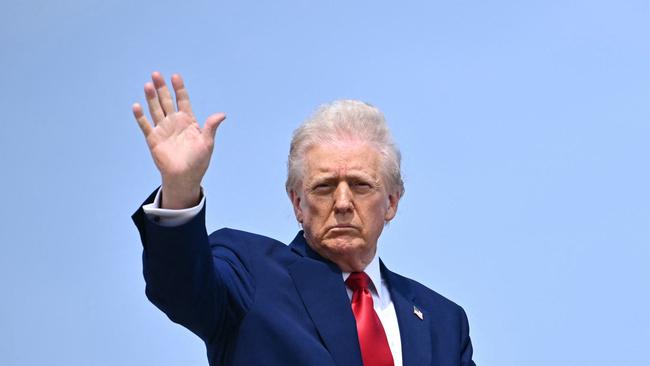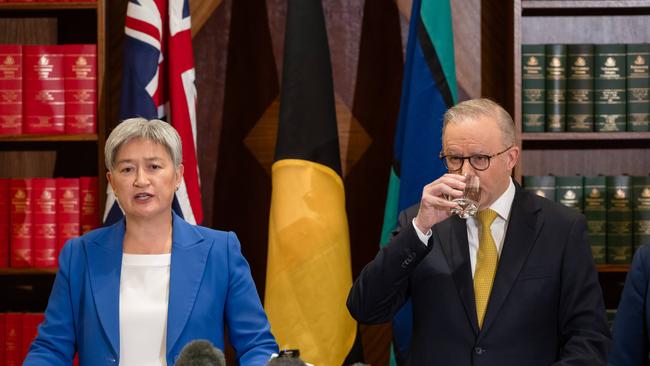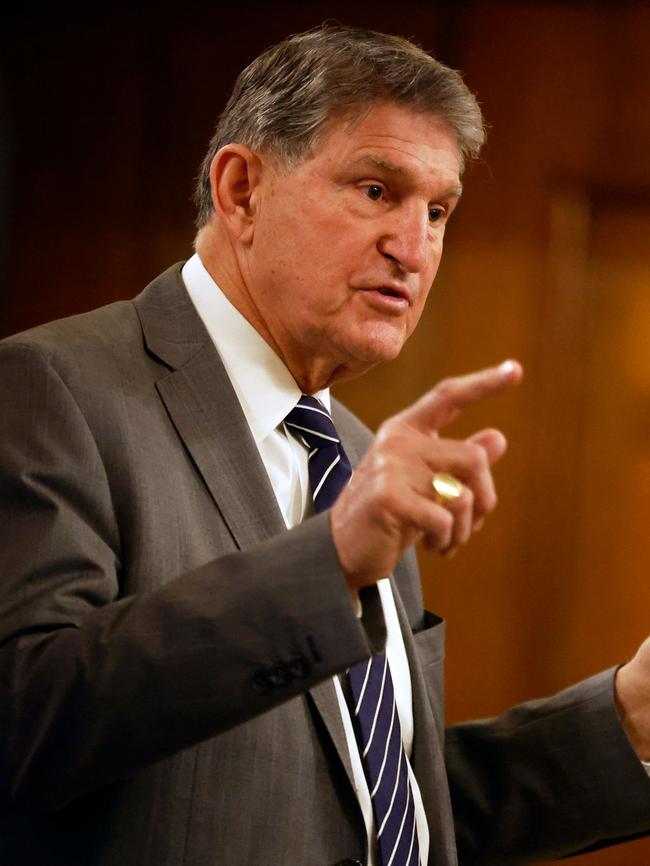Donald Trump trade deal with Australia off until after election, as embassy waits for Republican backlash
Australia’s diplomats in Washington will wait until after the election before approaching Donald Trump’s trade team over the removal or watering down of the 10 per cent blanket tariff.

Australia’s embassy in Washington will wait to see if Anthony Albanese or Peter Dutton wins the May 3 election before re-entering talks with the Trump White House over tariff carve-outs, despite an expected markets bloodbath as soon as Monday and warnings from Europe that globalisation is dead.
As both the Prime Minister and Opposition Leader prepare to face Donald Trump’s rewriting of the global economic order, one of Washington’s most controversial Senate powerbrokers is also warning them not to aggravate the President on tariffs.
The Australian understands the nation’s diplomats will wait at least a month before approaching Mr Trump’s trade team over the removal or watering down of the 10 per cent blanket tariff. The embassy will be hoping for renewed authority from the next prime minister and an intensification of Republican backlash against the President’s radical economic policies and their impact on both the price of US goods and the stockmarket.
In the event of a hung parliament, where Mr Albanese and Mr Dutton would need crossbench MPs to get into government, any hold-and-wait strategy from the embassy and US ambassador Kevin Rudd would take even longer before there is proper re-engagement.
The revelation comes as investors expect a further roiling of stockmarkets this week, with US S&P 500 futures down more than 6 per cent, and the ASX 200 futures markets pricing in a 4.3 per cent fall on the local share market on Monday.
There has also been shift from British Prime Minister Keir Starmer, who is set to argue in a speech on Monday that “globalisation is over”, that he understood Mr Trump’s economic nationalism, its popularity with voters and their disbelief in the benefits of free trade.
Foreign Minister Penny Wong said on Sunday the Albanese government would not deal with Mr Trump on any of the key sticking points his administration gave for Australia being hit with a 10 per cent tariff last week.
“We will not compromise on the Pharmaceutical Benefits Scheme. We will not comprise on Australia’s biosecurity … plus some of our digital regulation, we are not going to compromise on what it is to be Australian,” she told the ABC.
Mr Albanese has said there would be no negotiation on any of the issues seen by the US as an “effective” tariff, and took a veiled swipe at Mr Trump’s handling of economics, saying he understood in year 7 that border taxes hurt the country that imposes them more.

However, on Sunday, long-term congressional powerbroker Joe Manchin, who has frequently been lauded by Mr Trump as a “good guy” for his approach to deal-making, said Australia should not blow its chance to be the first country to receive a reprieve if it played its cards right and held off attacking the President.
“Everyone has gone apoplectic, but I would not jump in and attack if I were Australia,” Mr Manchin told The Australian. “If you do, the Trump administration will notice and they will respond. Your PM needs to show the value of the relationship between Australia and America, he does not need to be attacking what Trump is doing.”

During Trump’s first term, Mr Manchin supported Trump’s tariffs because they were, in part, about persuading allies to increase defence spending, something Australia has good standing on given military spending as a percentage of GDP exceeds 2 per cent.
“I can’t find a better country than Australia on defence. Australia would be the first to have the tariff renegotiated. It would be the country I would look at immediately,” Mr Manchin said.
However, this time he thinks the tariffs were likely to increase inflation and cause financial harm, which could see the President under significantly more pressure from his party in the second half of this year to do deals with countries.
“You have to remember that we have seen a recent vote where four Republicans went against Trump in their attempt to eliminate the tariffs on Canada. It’s a warning that they are concerned and I know there are other Republicans who might soon join, especially in the House. Once they start to see the effect on jobs or prices or political ratings. And I think that’s why the President has started to say that he’s willing to renegotiate,” Mr Manchin said.
On Friday, a day after announcing his “Liberation Day” tariffs, Mr Trump told reporters he would consider removing the tariffs if he could strike deals with countries.
“The tariffs give us great power to negotiate. Always have. I used it very well in the first administration, as you saw, but now we’re taking it to a whole new level,” he said.
Chief White House trade counsellor Peter Navarro, who has been challenged by other top Trump aides, has said the tariffs were not up for renegotiation.
The Australian reported last week that the 10 per cent US tariff impost on Australian goods came after a last-minute intervention from Mr Navarro, a known trade hawk, who demanded tariffs be placed across the board without exception.
Mr Navarro, a registered Democrat for more than two decades until he started backing Mr Trump, is understood to have been irate that Mr Trump allowed Australia to be exempt from steel and aluminium tariffs in the President’s first term.
Senator Wong said on Sunday the new Trump administration would also be more challenging in negotiations than the first.
“The second Trump administration is not the same as the first. The second Trump administration regrets exemptions it gave and has not given exemptions to anyone. And yet you still have Peter Dutton and his colleagues stubbornly insisting that they could do a deal at any cost,” she said.
Mr Manchin said Australia should keep its powder dry and wait for Mr Trump to renegotiate a deal.




To join the conversation, please log in. Don't have an account? Register
Join the conversation, you are commenting as Logout